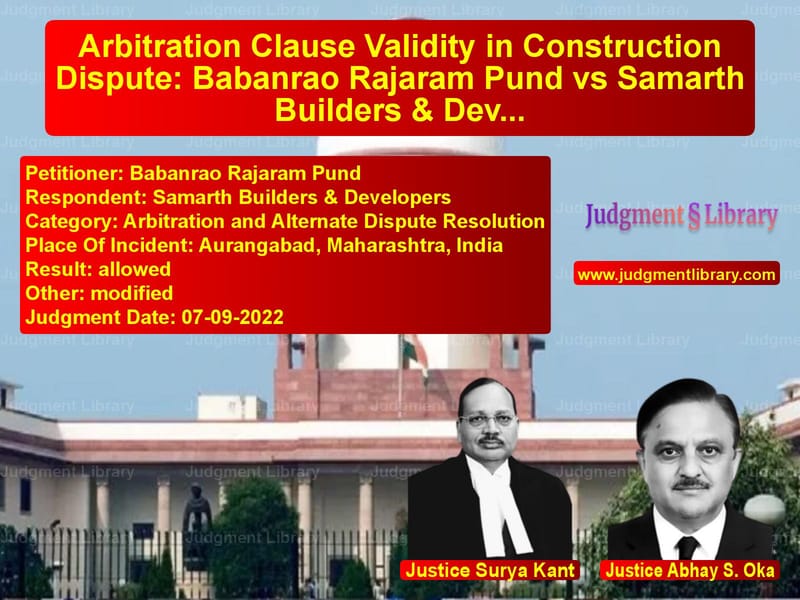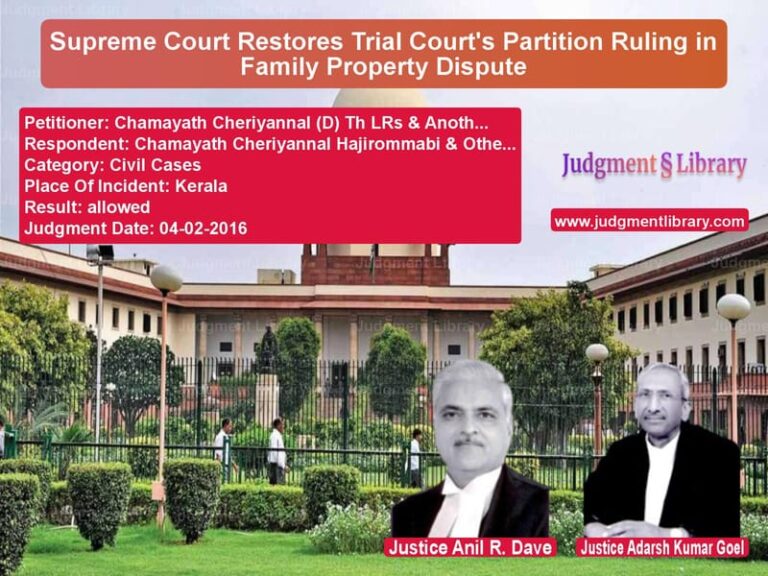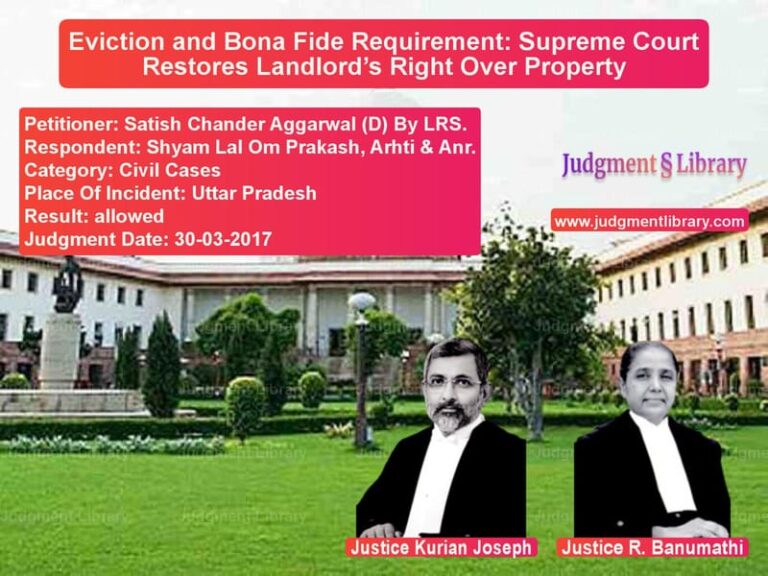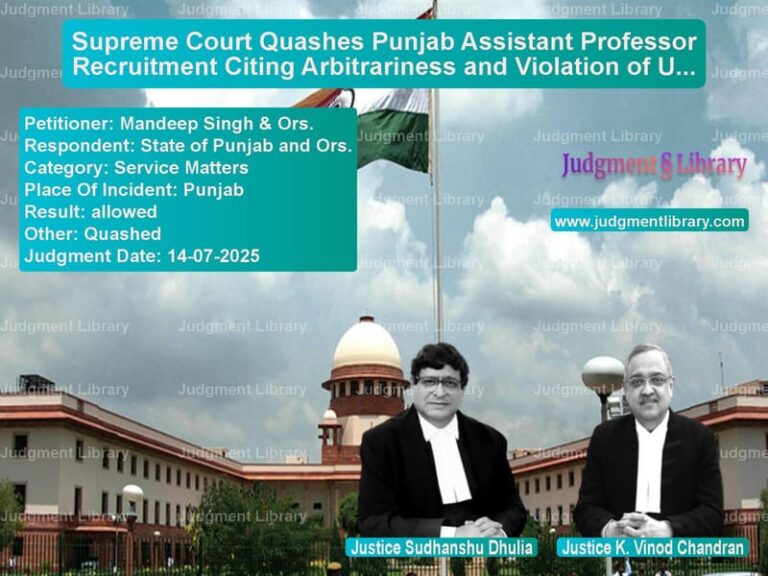Arbitration Clause Validity in Construction Dispute: Babanrao Rajaram Pund vs Samarth Builders & Developers
The case of Babanrao Rajaram Pund vs Samarth Builders & Developers delves into the validity of an arbitration clause in a Development Agreement between the appellant (Babanrao Rajaram Pund) and the respondents (Samarth Builders & Developers). The dispute arose regarding the interpretation and enforcement of the arbitration clause in the Development Agreement dated 29.05.2014, which was executed for the construction of ‘Amay Apartments’ on the appellant’s land in Aurangabad, Maharashtra. The main legal issue at stake was whether Clause 18 of the agreement constituted a valid and enforceable arbitration agreement.
Background of the Case
The appellant, Babanrao Rajaram Pund, owned land in Aurangabad, Maharashtra, which he intended to develop into residential and commercial complexes. The respondents, a partnership firm specializing in construction, entered into a Development Agreement with the appellant in 2014. Under the terms of the agreement, the respondents were responsible for constructing the ‘Amay Apartments’ on the appellant’s land, in exchange for a portion of the developed property. The parties also executed a General Power of Attorney (GPA) in favor of the respondents to facilitate the development work.
However, the respondents failed to complete the construction within the stipulated time frame of 15 months, despite the agreement allowing for a penalty for delays. The appellant issued a legal notice to the respondents, terminating the Development Agreement and the GPA. In response, the respondents contested the termination, resulting in a dispute that the appellant sought to resolve through arbitration, invoking Clause 18 of the agreement. The validity of the arbitration clause became the subject of the legal battle.
The Petitioner’s Arguments
The appellant, represented by counsel, argued that Clause 18 of the Development Agreement constituted a valid arbitration agreement. He highlighted that the clause explicitly mentioned that any disputes or differences arising between the parties should be referred to arbitration. The appellant pointed out that the clause clearly stated that the disputes should be resolved by a sole arbitrator or, failing that, by a tribunal of three arbitrators appointed by the parties. The appellant also emphasized that the parties had agreed to the arbitration process under the Arbitration and Conciliation Act, 1996, indicating their intention to resolve the disputes through arbitration.
Furthermore, the appellant argued that the High Court’s decision to dismiss his application for the appointment of an arbitrator was incorrect. He contended that the presence of an arbitration clause, coupled with the clear intention of the parties to resolve their disputes through arbitration, made it a valid clause under the Arbitration and Conciliation Act. The appellant also relied on prior case law, including Bihar State Mineral Development Corporation v. Encon Builders (2003) and Karnataka Power Transmission Corporation v. Deepak Cables (2014), to support his position that an arbitration agreement need not be in any specific form as long as the parties’ intent to arbitrate was clear.
The Respondent’s Arguments
The respondents, represented by their counsel, contended that Clause 18 of the Development Agreement did not constitute a valid and binding arbitration agreement. The respondents argued that the clause lacked the necessary elements to be enforceable under the Arbitration and Conciliation Act, 1996. They pointed out that the clause did not explicitly state that the parties would be bound by the arbitrator’s decision, nor did it include the term “final and binding” as required by legal standards for an arbitration agreement.
Additionally, the respondents referred to the decision in Deepak Cables (2014), where the Court had held that an arbitration clause that lacked essential elements, such as a binding commitment to arbitration, was not valid. The respondents also contended that the absence of a clear reference to the arbitration process, especially regarding the binding nature of the arbitrator’s award, rendered the clause unenforceable.
The Court’s Analysis
The Supreme Court analyzed the language and intent behind Clause 18 of the Development Agreement. The Court emphasized that an arbitration agreement need not be in any specific form as long as the intention of the parties to resolve their disputes through arbitration is clear. The Court cited the earlier decision in K.K. Modi v. K.N. Modi (1998) and noted that the essential requirements for an arbitration agreement were the intention to arbitrate and the mutual consent of the parties.
The Court further clarified that the inclusion of the term “arbitration” and the appointment procedure for the arbitrator in Clause 18 demonstrated a clear intent to arbitrate. The Court also noted that while the clause did not explicitly state that the arbitrator’s decision would be “final and binding,” this did not invalidate the clause. The Court reasoned that the overall language of the agreement suggested that the parties intended to be bound by the decision of the arbitrator. The Court also pointed out that the absence of the “final and binding” term was not a legal impediment, as long as the parties’ intention to resolve the dispute through arbitration was evident from the clause.
Final Judgment
The Supreme Court ruled in favor of the appellant, holding that Clause 18 of the Development Agreement constituted a valid and enforceable arbitration agreement. The Court set aside the High Court’s decision, which had dismissed the appellant’s application for the appointment of an arbitrator. The Court directed the appointment of an arbitrator to resolve the dispute between the parties. In light of the nature of the case, the Court also appointed Mr. Justice P.V. Hardas, a former Judge of the Bombay High Court, as the sole arbitrator to resolve the disputes between the appellant and the respondents. The Court emphasized that the parties must adhere to the arbitration process as agreed upon in the contract.
Significance of the Judgment
This judgment is significant in reaffirming the principles surrounding the validity of arbitration clauses in contracts. The Court’s decision underscores that arbitration clauses need not be in a specific form as long as they demonstrate the parties’ clear intention to resolve disputes through arbitration. The ruling also highlights the importance of enforcing arbitration agreements to ensure that disputes are resolved efficiently, without resorting to lengthy litigation. This decision will have implications for the interpretation of arbitration clauses in future contract disputes, particularly in cases involving commercial agreements like development contracts.
Read also: https://judgmentlibrary.com/supreme-court-orders-arbitration-in-sikkim-hotel-lease-dispute/
Petitioner Name: Babanrao Rajaram Pund.Respondent Name: Samarth Builders & Developers.Judgment By: Justice Surya Kant, Justice Abhay S. Oka.Place Of Incident: Aurangabad, Maharashtra, India.Judgment Date: 07-09-2022.
Don’t miss out on the full details! Download the complete judgment in PDF format below and gain valuable insights instantly!
Download Judgment: babanrao-rajaram-pun-vs-samarth-builders-&-d-supreme-court-of-india-judgment-dated-07-09-2022.pdf
Directly Download Judgment: Directly download this Judgment
See all petitions in Arbitration Awards
See all petitions in Settlement Agreements
See all petitions in Judgment by Surya Kant
See all petitions in Judgment by Abhay S. Oka
See all petitions in allowed
See all petitions in Modified
See all petitions in supreme court of India judgments September 2022
See all petitions in 2022 judgments
See all posts in Arbitration and Alternate Dispute Resolution Category
See all allowed petitions in Arbitration and Alternate Dispute Resolution Category
See all Dismissed petitions in Arbitration and Alternate Dispute Resolution Category
See all partially allowed petitions in Arbitration and Alternate Dispute Resolution Category







